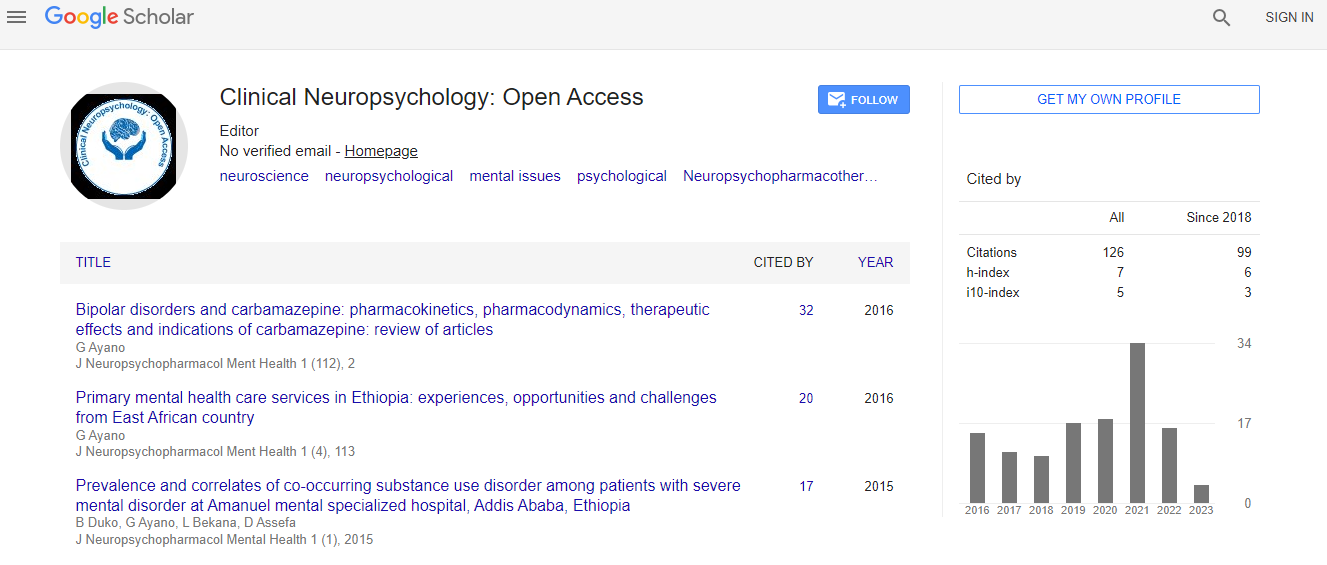Our Group organises 3000+ Global Conferenceseries Events every year across USA, Europe & Asia with support from 1000 more scientific Societies and Publishes 700+ Open Access Journals which contains over 50000 eminent personalities, reputed scientists as editorial board members.
Open Access Journals gaining more Readers and Citations
700 Journals and 15,000,000 Readers Each Journal is getting 25,000+ Readers
Google Scholar citation report
Citations : 141
Clinical Neuropsychology: Open Access received 141 citations as per Google Scholar report
Indexed In
- Google Scholar
- RefSeek
- Hamdard University
- EBSCO A-Z
- OCLC- WorldCat
Useful Links
Recommended Journals
Related Subjects
Share This Page
Introducing an artificial quick language for targeted behavioral modification during sleep
8th Global Experts Meeting on Advances in Neurology and Neuropsychiatry
Mohammad Reza Saebipour and Kazem Ghaemi
Birjand University of Medical Sciences, Iran
Posters & Accepted Abstracts: ClinNeuropsychol
Abstract
Introduction & Aim: Ability to change an undesired behavior at the individual level has a great importance not only for health, but also for personal and social development of humankind. Changing behavior is the basis of treating eating disorders, obesity and different kinds of addictions such as drug, smoke and recently addiction like mobile phone dependence. Improving a lifestyle with low physical activity is helpful in prevention of metabolic syndrome. Moreover, many psychiatric disorders benefit from behavioral modifications. Unfortunately, these simple changes in behavior cannot happen easily. An innovative solution to this problem can be find through sleep manipulation. For example, researchers have reported successful intervention for smoke cession by reactivating smoking behavior memories with an unpleasant smell during sleep. This study highlighted the value of using appropriate cues as potential approaches for communicating with a sleeping person with considerable after effect. But for complex behaviors the capacity of such meaningful cues for offering during sleep needed to be expanded. Our purpose in this study was designing and assessment of novel linguistic methods for behavioral changes during sleep. Methodology & Theoretical Orientation: We have designed a new Artificial Quick Language (AQL) consisted of a bank of short sounds conditioned with most commonly used words with a musical simple grammar. This specific language after montage and playing with specific software can be heard and understood by volunteer subjects after a period of training. Mechanism for sound selection was based on the shortest equivalent verb in any natural language as a result we have a combination of very short verbs from different languages. This platform enables us to compose our targeted phrases. Conclusion & Significance: A new sophisticated approach for control of undesired behaviors based on verbally communication during early stages of sleep is introduced.Biography
E-mail: Mohammad-reza.saebipour@alumni.uni-heidelberg.de

 Spanish
Spanish  Chinese
Chinese  Russian
Russian  German
German  French
French  Japanese
Japanese  Portuguese
Portuguese  Hindi
Hindi 